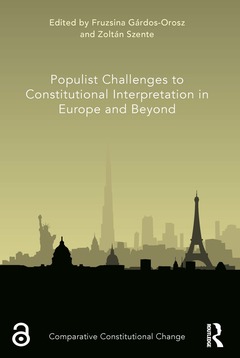Populist Challenges to Constitutional Interpretation in Europe and Beyond Comparative Constitutional Change Series
Coordonnateurs : Gárdos-Orosz Fruzsina, Szente Zoltán

This book explores the relationship between populism or populist regimes and constitutional interpretation used in those regimes.
The volume discusses the question of whether contemporary populist governments and movements have developed, or encouraged new and specific constitutional theories, doctrines and methods of interpretation, or whether their constitutional and other high courts continue to use the old, traditional interpretative tools in constitutional adjudication. The book is divided into four parts. Part I contains three chapters elaborating the theoretical basis for the discussion. Part II examines the topic from a comparative perspective, representing those European countries where populism is most prevalent, including Austria, Croatia, the Czech Republic, Greece, Hungary, Italy, Poland, Romania, Spain, and the United Kingdom. Part III extends the focus to the United States, reflecting how American jurisprudence and academia have produced the most important contributions to the theory of constitutional interpretation, and how recent political developments in that country might challenge the traditional understanding of judicial review. This section also includes a general overview on Latin America, where there are also some populist governments and strong populist movements. Finally, the editors? closing study analyses the outcomes of the comparative research, summarizing the conclusions of the book.
Written by renowned national constitutional scholars, the book will be essential reading for students, academics and researchers working in Constitutional Law and Politics.
Chapter 1 of this book is freely available as a downloadable Open Access PDF at http://www.taylorfrancis.com under a Creative Commons Attribution-Non Commercial-No Derivatives (CC-BY-NC-ND) 4.0 license.
PART I Theoretical implications
Populism and populist constitutionalism
The art of constitutional interpretation
An ‘Instrument of Government’ or ‘Instrument of Courts’? The Impact of Political Systems on Constitutional Interpretation and the Case of Populism
Can There be Autochthonous Methods of Constitutional Interpretation?
PART II Constitutional interpretation and populism in Europe
Formalism and Judicial Self-Restraint as Tools Against Populism? Considerations Regarding Recent Developments of the Austrian Constitutional Court
The Czech Constitutional Court in Times of Populism:From Judicial Activism to Judicial Self-Restraint
Popular Initiatives, Populism and the Croatian Constitutional Court
Constitutional identity as a populist notion?
Constitutional interpretation under the new Fundamental Law of Hungary
The populist reforms in Italy and the instrument of the constitutionally conforming interpretation
Whatever works - Constitutional Interpretation in Poland in Times of Populism
Non sequiturs in Constitutional Adjudication: Populism or Epistemic Deficit?
Constitutional Interpretation and Populism. The case of Spain
Populism, UK sovereignty, the rule of law and Brexit
PART III An Outlook
Born Populist: The Trump Administration, the Courts and the Constitution of the United States
Constitutional Interpretation: What can Europeans learn from US debates?
Populist and non-democratic reading of the Constitution
PART IV Summary
Populist challenges to constitutional interpretation
Fruzsina Gárdos-Orosz is Director and Senior Research fellow of the Institute for Legal Studies, Centre for Social Sciences, Hungary, and also Associate Professor in Constitutional Law at the ELTE Law School in Budapest, Hungary.
Zoltán Szente is Professor of Law at the Department of Constitutional Law, National University of Public Service, and he is a Research Professor at the Institute for Legal Studies, Centre for Social Sciences of the Hungarian Academy of Sciences, Budapest. He is a co-chair of the IACL Research Group on Constitutional Interpretation, and a Vice-president of the Independent Group of Experts of the Council of Europe.
Date de parution : 01-2023
15.6x23.4 cm
Date de parution : 05-2021
15.6x23.4 cm
Thèmes de Populist Challenges to Constitutional Interpretation in... :
Mots-clés :
EU Immigration Policy; EU Data Retention Directive; Constitutional Law; EU Charter; Constitutional Politics; UK’s Constitution; Constitutional Theory; Vice Versa; Constitutional Interpretation; Primary EU Law; Populist constitutionalism; Common Language; Populism; Direct Democracy; Courts; Constitutional Courts; Politicization of the Judiciary; EU Law; Populist challenges; UK Parliament; Europe; Constitutional Court; Constitutional Tribunal; Austrian Constitutional Court; Croatian Constitutional Court; Constitutional Identity; National Legal Culture; Security Decree; Sewel Convention; National Populist Movements; Constitutional Complaints; UK’s Accession; UK Supreme Court; West Germany



